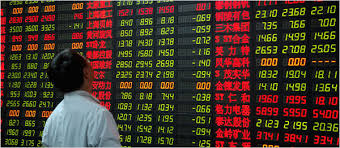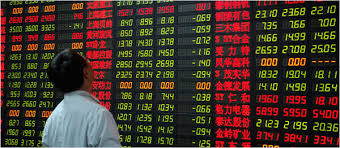
With a renewed slide in oil prices giving investors few reasons to reassess a darkening outlook for the global economy, a plunge in Chinese share markets capped a miserable day for Asian equities on Tuesday.
With MSCI's broadest index of Asia-Pacific shares outside Japan falling 1.5 percent after two days of gains since late last week, Japan's Nikkei fell 2.4 percent while Hong Kong's Hang Seng Index declined 2.3 percent.
In another sign that authorities in Beijing have their work cut out in their efforts to stabilise the fickle domestic markets, mainland Chinese shares slumped more than six percent to a 14-month low.
It is expected that the same fate is in store for the European shares as well.
Britain's FTSE and France's CAC 40 is expected by Spreadbetters to fall by as much as 0.8 percent and Germany's DAX to drop 0.7 percent.
"Wherever you look - China, oil and the U.S., there is no clear evidence of improvement in economic fundamentals. So in the near term, it is hard to expect risk asset prices to gain further after a spate of short-covering," said Tatsushi Maeno, managing director at PineBridge Investments.
As top producers show no sign of cutting production, crude oil prices have tumbled around 7 percent so far this week.
The firm is continuing to invest in oil and gas production capacity, despite cost-cutting because of low oil prices, said the chairman of Saudi Aramco on Monday.
A senior Iraqi official said Iraq may raise output further this year even as Iraq's output reached a record last month.
As global output was boosted by U.S. shale oil production and demand growth turned tepid, partially caused by the Chinese economy's slowing growth, oil prices have fallen more than 75 percent from their 2012 peaks.
The energy firms are slashing investment and cutting jobs as the massive price fall is putting huge pressure on profitability of energy firms worldwide.
The U.S. S&P fell 1.6 percent to 1,877.08, led by a 4.5 percent drop in the energy sector.
There was a drop of 7.2 percent or 2.1 percent in Tuesday Asian trade for the Brent crude futures, the global benchmark, as prices dropped to touch $30 a barrel so far this week.
As investors grew concerned about their heavy lending to the energy sector, financial shares were also badly hit.
More than the energy sector's 11.2 percent, the U.S. financial shares in fact have fallen 12.8 percent so far this year.
Vague hopes that the U.S. Federal Reserve may tone down its bias towards further policy tightening and that the Bank of Japan may expand its stimulus are countering selling pressure for the moment, say market experts. Both will hold policy reviews this week.
The Bank of Japan's announcement on Friday would follow the U.S. Federal Reserve's policy statement which is due on Wednesday.
As the U.S. economy continues to grow and despite market volatility, Fed officials have so far stuck to the line that the bank would be ready to raise interest rates four times this year.
(Source:www.reuters.com)
With MSCI's broadest index of Asia-Pacific shares outside Japan falling 1.5 percent after two days of gains since late last week, Japan's Nikkei fell 2.4 percent while Hong Kong's Hang Seng Index declined 2.3 percent.
In another sign that authorities in Beijing have their work cut out in their efforts to stabilise the fickle domestic markets, mainland Chinese shares slumped more than six percent to a 14-month low.
It is expected that the same fate is in store for the European shares as well.
Britain's FTSE and France's CAC 40 is expected by Spreadbetters to fall by as much as 0.8 percent and Germany's DAX to drop 0.7 percent.
"Wherever you look - China, oil and the U.S., there is no clear evidence of improvement in economic fundamentals. So in the near term, it is hard to expect risk asset prices to gain further after a spate of short-covering," said Tatsushi Maeno, managing director at PineBridge Investments.
As top producers show no sign of cutting production, crude oil prices have tumbled around 7 percent so far this week.
The firm is continuing to invest in oil and gas production capacity, despite cost-cutting because of low oil prices, said the chairman of Saudi Aramco on Monday.
A senior Iraqi official said Iraq may raise output further this year even as Iraq's output reached a record last month.
As global output was boosted by U.S. shale oil production and demand growth turned tepid, partially caused by the Chinese economy's slowing growth, oil prices have fallen more than 75 percent from their 2012 peaks.
The energy firms are slashing investment and cutting jobs as the massive price fall is putting huge pressure on profitability of energy firms worldwide.
The U.S. S&P fell 1.6 percent to 1,877.08, led by a 4.5 percent drop in the energy sector.
There was a drop of 7.2 percent or 2.1 percent in Tuesday Asian trade for the Brent crude futures, the global benchmark, as prices dropped to touch $30 a barrel so far this week.
As investors grew concerned about their heavy lending to the energy sector, financial shares were also badly hit.
More than the energy sector's 11.2 percent, the U.S. financial shares in fact have fallen 12.8 percent so far this year.
Vague hopes that the U.S. Federal Reserve may tone down its bias towards further policy tightening and that the Bank of Japan may expand its stimulus are countering selling pressure for the moment, say market experts. Both will hold policy reviews this week.
The Bank of Japan's announcement on Friday would follow the U.S. Federal Reserve's policy statement which is due on Wednesday.
As the U.S. economy continues to grow and despite market volatility, Fed officials have so far stuck to the line that the bank would be ready to raise interest rates four times this year.
(Source:www.reuters.com)





